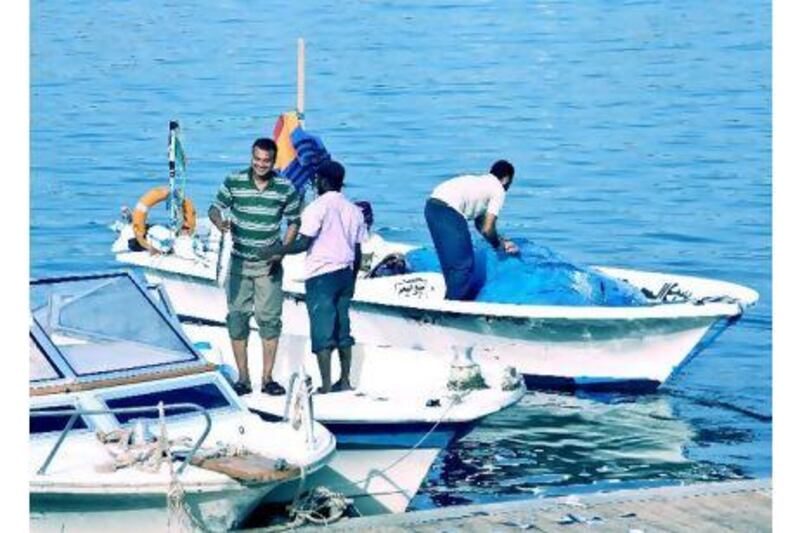KUWAIT CITY // Overfishing is destroying Kuwait's fish stocks and driving up the prices of local seafood, Kuwaiti fishermen said this week.
The decline in fish stocks has become so severe that the government is considering a two-year ban on all fishing in Kuwaiti waters.
The public authority for agriculture and fish resources (PAAFR), large private companies and small independent fishermen agree that the shortage is becoming a crisis but disagree over who is to blame.
"Before, our sea was good for fishing. Now, it's terrible," said Fadel Al Dabbous, a Kuwaiti with 40 years experience in the fishing industry. Mr Al Dabbous, 52, said the sea is so barren it is "like a swimming pool" and his 12 boats, each crewed by four men, only fish when they can make a profit during the peak four months of the season.
Mr Al Dabbous's boats specialise in catching creatures that live near the seabed, such as hammour and lobster. He said large local shrimp companies have "destroyed our sea" with a practice known as bottom trawling, in which heavy nets are dragged over the sea floor.
"The fish want to lay eggs in pores in the sea floor that create a natural shelter, but the habitat has been destroyed by trawling," he said. "When they can't breed in the open sea, they go elsewhere."
The days when Kuwaitis regularly took to the seas to dive for oysters or catch fish have passed with the advent of oil wealth. About 700 Kuwaitis still own small fishing boats, but they are operated by 2,000 to 3,000 foreigners, mostly Egyptians, Indians and Bangladeshis.
Mr Al Dabbous said his boats catch 20 times less than they did in the early 1990s and the scarcity of local fish has caused prices to surge. He said a six or seven kilogram Kuwaiti hammour costs between 30 and 70 Kuwaiti dinars (Dh400 and Dh935) in the local market, over three times the price four years ago.
The PAAFR "doesn't have the experience" to cope with the collapse of fish stocks and the government's scheme to ban fishing for two years "is a silly idea" because there has been no scientific studies to determine if the plan will work, he said.
Khaled Al Enezi, 48, the deputy head of the Kuwait Fishermen's Union, said "even the children in the street" know that the large shrimp companies are destroying Kuwait's marine environment. He said the government is helping the companies with subsidies while independent fishermen receive nothing.
The companies' large boats "take everything" from the sea, Mr Al Enezi said. He believes the government should tax the shrimp companies because they export their catch, adding that the local fishermen only sell in the local market.
"For shrimp they have destroyed the sea," he said, suggesting that the government make shrimp farms or import the country's needs. "Where are the fish?" he asked. "We don't have anything left."
The economic difficulties of being a Kuwaiti fisherman are compounded by the region's often fractious politics. Mr Al Enezi said Kuwaitis fear to stray beyond the country's maritime borders into international waters - about 30km from the shore - because they have been known to disappear. He blames the Iranian navy for abducting Kuwaiti fishermen in the past.
Naser Asad, a spokesman for the PAAFR, said he has heard that the government is considering a two-year ban "to give a chance for the fish to rehabilitate" but admits the idea needs more study. He said shrimp companies get government subsidies because they invest in large-scale aquaculture projects, such as fish and shrimp farms, that "diversify food resources in Kuwait".
The local fishermen are correct about the shrimp companies receiving subsidies, but to say they destroy the seas "is an accusation", Mr Asad said. "You have a lot of pressure points" on the marine environment: fishermen, climate change and oil tanker activity.
Ali Rihani, a representative of National Fishing Company, a firm that operates 14 shrimp boats in Kuwaiti waters, said: "We have a big problem in Kuwaiti waters: there are no fish, no shrimp."
The company imports from countries such as Iran, Vietnam and India when it is low on stock and exports to Jordan and Lebanon when the economic conditions are suitable.
The shrimp season lasts from September to January, a period when shrimp are fully grown but before their eggs hatch in February. Mr Rihani believes the shortage of Kuwaiti seafood has been caused by illegal shrimping when the season is finished.
"They are catching the mothers of the shrimp," he said. "Our company would never do that. We know, 100 per cent, that some people are catching illegally, but who it is, I cannot say."
[ jcalderwood@thenational.ae ]
See editorial page A15





